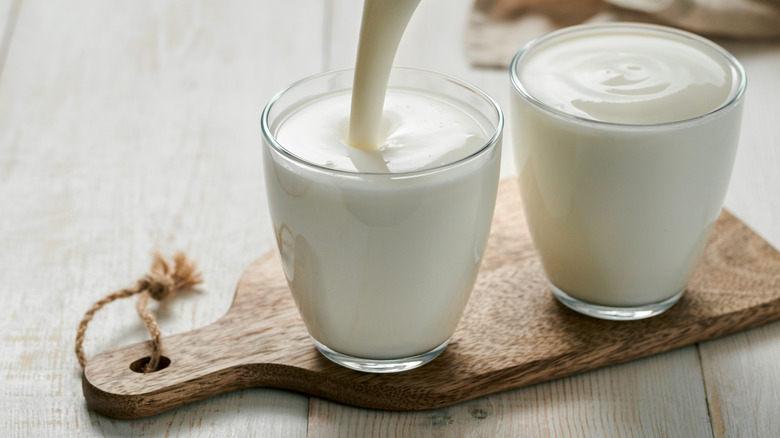Eat This Kind Of Protein To Help Lower High Blood Pressure
High blood pressure can creep up on you. If left untreated, it can lead to heart disease, heart attack, or stroke, according to the Centers for Disease Control and Prevention.
You can take medication to reduce your blood pressure, but many people can manage their blood pressure by changing their lifestyle. Exercising at least 150 minutes a week, quitting smoking, and reducing stress can keep your blood pressure at a healthy range. It also helps to watch your weight and modify your diet by reducing sodium and including foods rich in calcium, magnesium, and potassium. In particular, the Dietary Approaches to Stop Hypertension (DASH) diet suggests eating more fruits, vegetables, and whole grains while limiting saturated fats in meats and full-fat dairy.
However, eliminating all dairy might not be the best approach, according to a 2022 review in Nutrients. Casein protein, which makes up about 80% of the protein found in milk and milk products, can reduce systolic blood pressure by an average of 3.20 mmHg and diastolic pressure by 1.50 mmHg.
How casein protein works to reduce blood pressure
Casein is a complete protein containing all the amino acids your body needs; and it is slow-digesting, which provides a steady supply of nutrients to your muscles and organs. Casein hydrolysate, in particular, works by inhibiting the angiotensin I-converting enzyme, or ACE enzyme, which can constrict blood vessels and trigger inflammation. It may also help neutralize free radicals in the body. By adding more casein protein to your diet, you may be able to significantly and naturally lower your blood pressure, according to the 2022 review in Nutrients.
According to the American Heart Association, having a little more weight can put additional stress on your heart and blood vessels. Casein protein can also help you reduce excess weight, according to Cleveland Clinic. If you consume foods with casein protein, your stomach digests them more slowly. This helps you to feel fuller between meals and can reduce your cravings. The leucine in casein also speeds your body's metabolism.
The best sources of casein protein
Dairy products like milk, yogurt, and cheese are rich in casein protein. Bodybuilders often use casein protein powder to augment their protein intake because it's absorbed more slowly by the body. Consuming casein protein before going to sleep not only helps reduce your blood pressure but also helps your muscles repair and build while you're at rest (per Cleveland Clinic).
You might have heard about A2 milk, particularly if you have lactose intolerance. That's because milk has two types of casein — A1 and A2 beta-casein. Some cows in Northern Europe produce milk that is richer in the A1 beta-casein, while those in southern France and the Channel Islands off the French coast produce milk with more A2. Milk that is marketed as A2 only has the A2 casein and reportedly doesn't cause as much bloating in people with lactose intolerance (per Healthline). According to a 2021 article in The Journal of Nutrition, animal studies have shown that consuming A1 casein protein can increase cholesterol, but studies in humans haven't found this link. A2 milk seems to have some beneficial effects and is easier to digest for some people.



